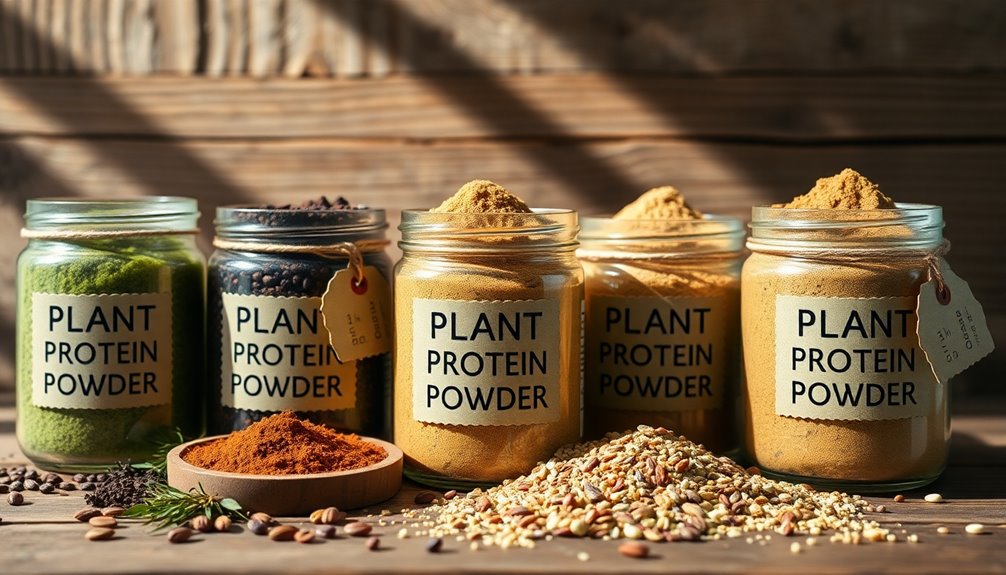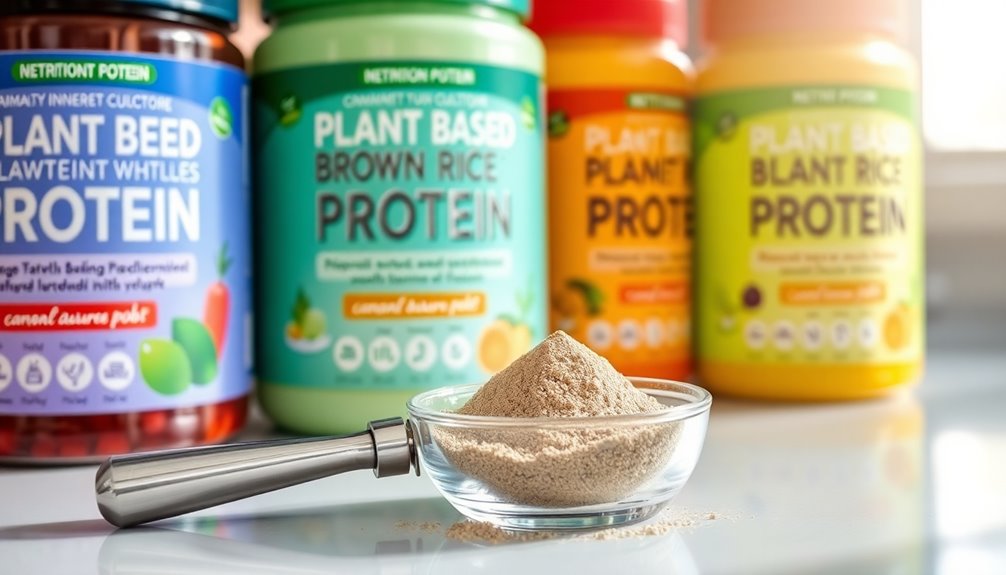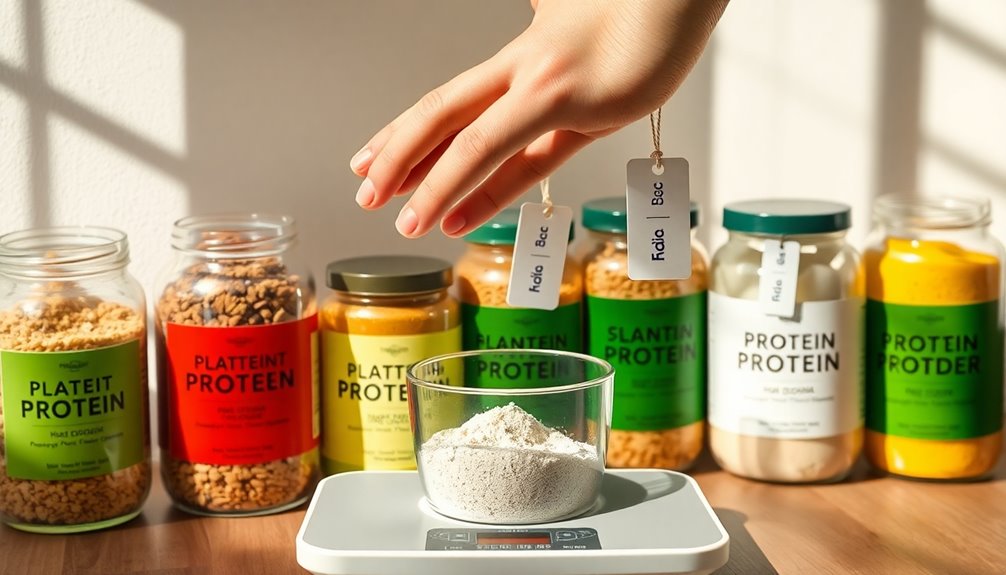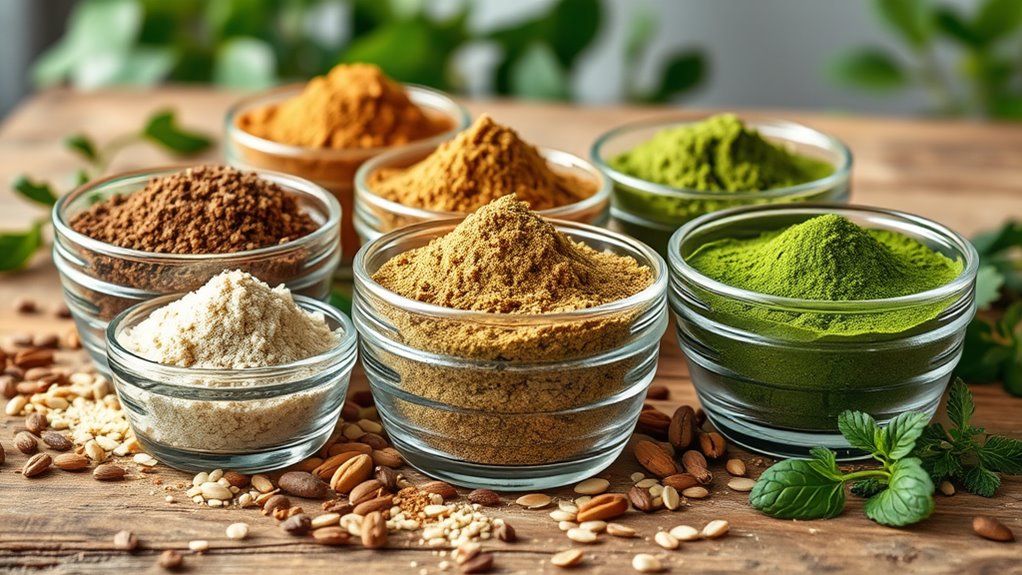When selecting plant-based protein powders, prioritize protein quality and ingredient transparency. Look for complete protein sources like quinoa or soy, which offer balanced amino acids. Guarantee the powder contains at least 15-20 grams of protein per serving. Pay attention to ingredient sourcing; choose brands with sustainable practices and certifications like organic or non-GMO. Consider flavor and texture, as these affect your enjoyment. Also, check for additives and allergens that might not align with your health goals. By choosing wisely, you're empowering your nutrition and the planet. For a deeper understanding, you might want to explore more aspects of effective selection.
Key Takeaways
- Choose plant-based protein powders with at least 15-20 grams of protein per serving for optimal nutritional value.
- Prioritize brands that ensure sourcing transparency, sustainable farming practices, and relevant certifications like organic and non-GMO.
- Evaluate the amino acid profile; complete proteins like quinoa and soy provide a balanced amino acid intake.
- Assess flavor and texture preferences to enhance your experience and maintain consistency in your dietary routine.
- Research brand reputation, customer reviews, and scientific validations to ensure product quality and effectiveness.
Understanding Protein Sources

Understanding protein sources is fundamental for anyone exploring a plant-based diet or supplementing with protein powders. When you choose a protein source, you need to pay attention to its amino acid content and digestibility. Amino acids are the basic elements of protein, and not all plant proteins contain the complete set your body needs.
For example, quinoa and soy are complete proteins, while others, like pea and rice, may lack certain essential amino acids. Combining different sources can help you achieve a balanced profile.
Sustainability is another vital factor to take into account. Plant-based protein sources generally have a lower environmental impact compared to animal-based options. They require less water, land, and energy for production, making them a more eco-friendly choice.
When sourcing your protein powder, look for brands that prioritize sustainable farming practices and ethical sourcing. This not only benefits the planet but also supports local farmers and communities. Moreover, incorporating plant-based foods into your diet can provide significant health benefits beyond just protein intake.
Digestibility is also significant. Some plant proteins can be more challenging to digest due to anti-nutrients present in raw forms. However, many brands now use advanced processing techniques to improve digestibility and reduce these compounds, making protein powders more accessible for your body.
Evaluating Ingredient Quality

When selecting a plant-based protein powder, evaluating ingredient quality plays an important role in ensuring you're making a wise choice. You want to know exactly what you're putting into your body, which is why sourcing transparency is vital. Investigate where the ingredients come from; brands that openly share this information usually prioritize quality and ethics. Look for products that provide details about their sourcing, as this can reflect their commitment to responsible practices.
In addition, pay attention to the manufacturing processes. High-quality protein powders typically undergo minimal processing, preserving the integrity of the nutrients. Brands that adhere to strict quality standards often highlight their methods, which can boost your confidence in your purchase.
Certifications are another significant aspect to take into account. Products with organic certifications ensure that the ingredients are grown without harmful pesticides or chemicals. Moreover, non-GMO sourcing indicates that the ingredients haven't been genetically modified, aligning with a growing preference for natural products among health-conscious consumers.
Furthermore, be aware that many protein powders may contain heavy metals like lead and mercury, which can pose health risks if consumed regularly. As you assess various options, look for brands that emphasize their dedication to ingredient quality. This not only reflects their values but also connects you to a community that prioritizes health and sustainability. By focusing on sourcing transparency, manufacturing processes, and relevant certifications, you'll be empowered to choose a plant-based protein powder that aligns with your values and supports your health journey.
Checking Nutritional Information

As you explore different plant-based protein powders, checking the nutritional information is vital for making an informed decision. You'll want to start by examining the protein content. Different sources, like pea, hemp, or brown rice, offer varying amounts of protein per serving. Look for products that provide at least 15-20 grams of protein per serving to meet your daily needs effectively.
Next, consider the serving size. Some brands may list a smaller serving size to make their protein content appear higher, so it's important to compare the actual grams of protein you're getting.
Pay attention to the macros as well—this includes not just protein but also carbohydrates and fats. A balanced ratio can support your overall diet and fitness goals.
Don't forget to look at the sourcing of the ingredients. Knowing where the protein comes from can help you assess its quality and nutritional value. Brands that transparently share their sourcing practices often prioritize sustainability and ethical practices, which resonates with many consumers today. Additionally, consider how the protein fits into your overall dietary needs, as a custom keto diet plan can help you optimize your nutrition for better results.
Assessing Flavor and Texture

To ponder flavor and texture is crucial when selecting a plant-based protein powder that suits your taste preferences and lifestyle. You want a product that not only meets your nutritional needs but also pleases your palate. Different protein sources can greatly affect both flavor and texture, so be sure to explore your options.
When evaluating flavor, pay attention to the following:
- Sweetness: Some powders are naturally sweeter due to added flavors or sweeteners.
- Earthy Undertones: Certain plant proteins, like hemp or pea, may have an earthy taste that some love or dislike.
- Vanilla or Chocolate Hints: Many brands offer flavored options that can enhance your smoothies or shakes.
- Aftertaste: Some protein powders may leave a lingering taste that could impact your overall experience.
Texture is just as essential as flavor. Depending on your texture preferences, you might prefer a smoother, creamier shake or a thicker, more substantial blend. Here are a few aspects to take into account:
- Graininess: Some protein powders can feel coarse, which can be off-putting.
- Mixability: A good protein powder should dissolve easily in liquids without clumping.
- Consistency: Consider how thick you want your shake—some powders will yield a thinner texture, while others will be more substantial.
- Mouthfeel: The overall sensation in your mouth can significantly influence your enjoyment of the drink.
Choosing a protein powder that aligns with your taste and texture preferences can elevate your overall experience and promote consistency in your dietary routine. Additionally, selecting a plant-based protein powder can contribute to long-term health benefits, as plant-based diets promote longevity and lead to a longer, healthier life.
Examining Allergens and Additives

Exploring the world of plant-based protein powders requires awareness of potential allergens and additives that could impact your health and dietary choices. When selecting a protein powder, allergen precautions are vital, especially if you have known sensitivities to ingredients like soy, nuts, or gluten. Always check labels thoroughly to make sure the product is free from these allergens and consider whether it's produced in a facility that processes these ingredients. This can help you avoid any unexpected reactions.
Additive analysis is equally significant. Some protein powders contain additives to enhance flavor, texture, or shelf life. Common additives include artificial sweeteners, preservatives, and emulsifiers. While these can improve the taste and longevity of a product, they may not align with your health goals. Choosing a protein powder with minimal or no additives is often a safer bet. Look for products labeled as "clean" or "whole food," which typically use fewer synthetic ingredients.
Additionally, consider how the additives might impact your digestion. Some individuals may experience bloating or discomfort from certain ingredients. It's beneficial to experiment with different brands to find one that agrees with your body. Furthermore, being mindful of gluten-containing grains can help you avoid potential gut inflammation linked to certain protein powder additives.
Considering Price and Value

When it comes to plant-based protein powders, price and value play an important role in your purchasing decision. You want to ensure you're not only getting a good deal but also the nutritional value your body needs. A budget comparison can help you navigate the options available, ensuring you find a product that fits your financial plan without sacrificing quality.
Here are some key factors to ponder:
- Protein Content: Check how much protein you're receiving per serving. A higher protein content often indicates better value.
- Ingredient Quality: Look for whole food sources and minimal additives. Quality ingredients can make a significant difference in both health benefits and taste.
- Serving Size: Compare serving sizes across different brands. A lower price per pound mightn't be a bargain if the serving size is smaller.
- Brand Reputation: Research brands that are well-reviewed by the community. Trustworthy brands tend to offer better quality and customer support.
- Additionally, consider the inclusion of scientific explanations in the product, as understanding the benefits can enhance your purchasing decision.
Frequently Asked Questions
How Do Plant-Based Protein Powders Compare to Whey Protein in Effectiveness?
When you're comparing plant-based protein powders to whey protein, consider their nutritional value and digestibility. Plant-based options often offer a variety of nutrients and can be easier on your stomach.
While whey typically has a creamier taste and texture, many find that plant-based powders can be versatile in recipes. Ultimately, both can effectively support your fitness goals, but your personal preferences and dietary needs will guide your choice.
Can Plant-Based Protein Powders Support Muscle Gain and Recovery?
While some might think only whey protein fuels muscle gain, plant-based options can also deliver impressive benefits. They support muscle repair and enhance performance for athletes just like traditional proteins.
Research shows that plant-based protein powders provide essential amino acids, promoting recovery after intense workouts. Plus, they're easier on digestion for many, making them a great choice for anyone seeking to maximize their fitness journey while enjoying a sense of community in the plant-based movement.
Are There Specific Brands Known for High-Quality Plant-Based Protein Powders?
When it comes to high-quality plant-based protein powders, you've got some top recommendations. Brands like Orgain, Vega, and Garden of Life are celebrated for their nutritional benefits, offering a balanced mix of protein, fiber, and essential amino acids. These options not only support muscle gain but also promote overall health.
Selecting a reputable brand guarantees you're fueling your body with the right nutrients, aiding you feel connected to a community that values well-being.
How Should I Store Plant-Based Protein Powders for Freshness?
To keep your plant-based protein powders fresh, store them in a cool, dry place, away from direct sunlight. Use airtight containers to prevent moisture and air exposure, which can compromise freshness and shelf life. You'll want to check the expiration date for best preservation.
If you live in a humid area, consider refrigerating them, but let them come to room temperature before use. Following these steps guarantees you enjoy their full benefits!
Can I Use Plant-Based Protein Powders in Baking or Cooking?
Imagine whipping up a batch of cookies, each bite packed with the goodness of plant-based protein. You can definitely use these powders in baking and cooking! Try adding them to smoothies, pancakes, or energy balls for a nutritional boost. They provide essential amino acids, helping you feel full and satisfied.
Recipe suggestions like protein-packed muffins or savory veggie burgers can enhance your meals while supporting your health goals, so you'll feel great sharing them with others!
Conclusion
When choosing a plant-based protein powder, prioritize quality ingredients, assess nutritional content, and consider flavor and texture. Don't forget to check for allergens and additives, and evaluate price versus value. By focusing on these key factors, you'll guarantee you're making an informed decision that meets your dietary needs and taste preferences. With the right protein powder, you'll fuel your body effectively and enjoyably, helping you reach your health and fitness goals with confidence.



